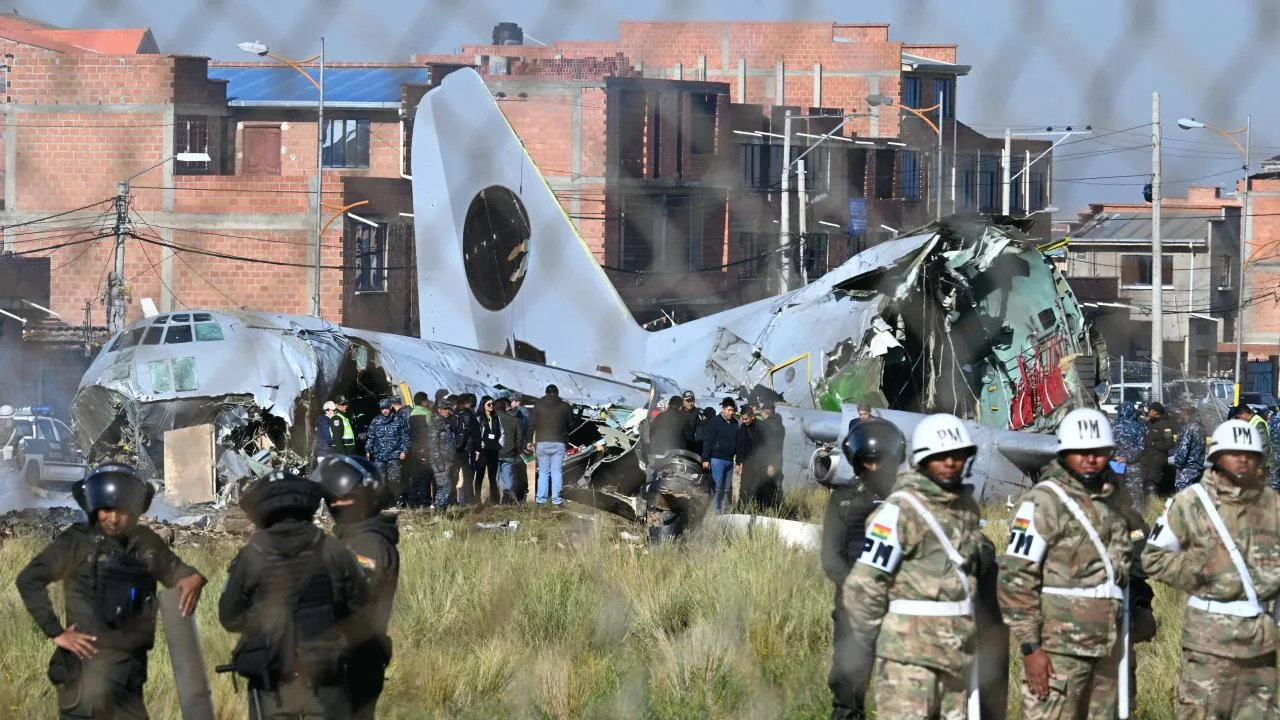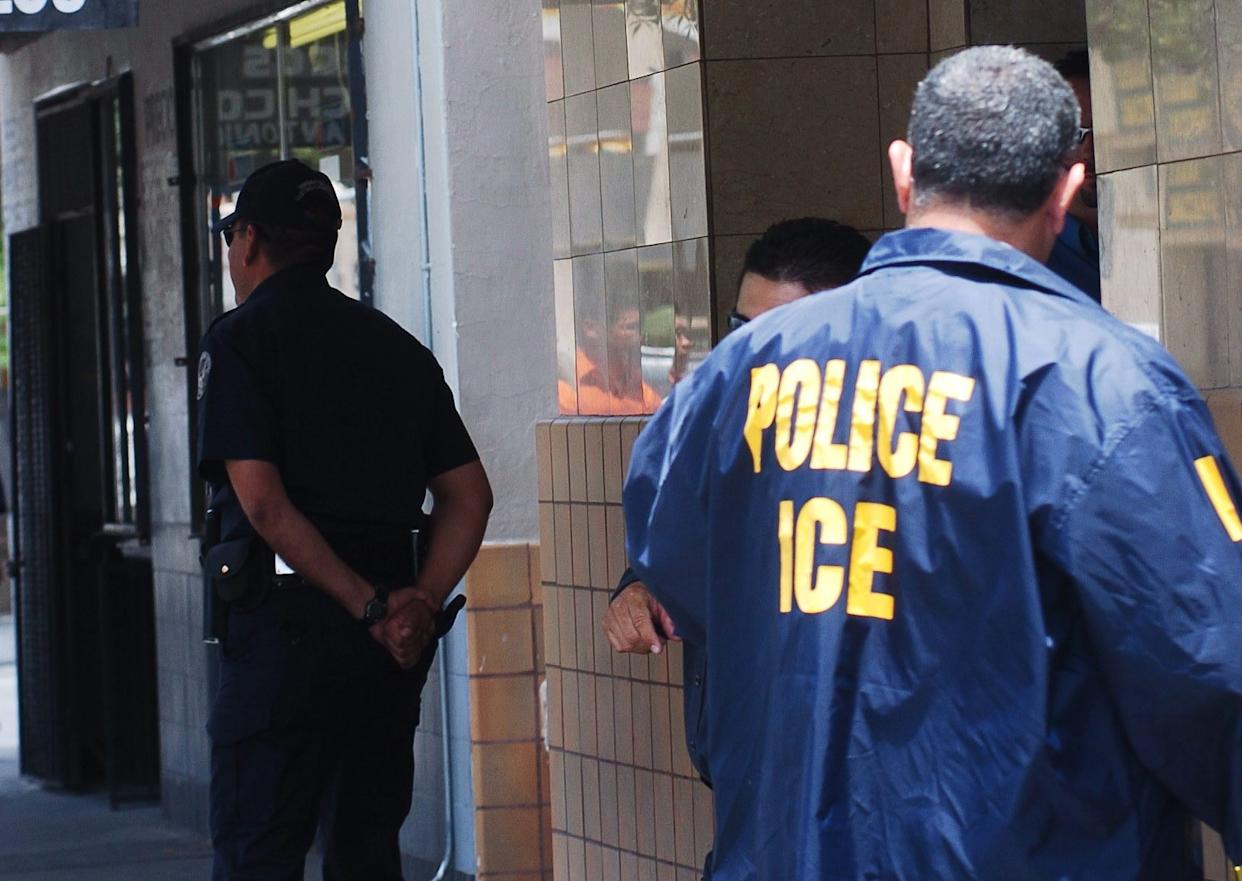International
Colombia’s Duque says deploying military to protest-hit Cali

AFP/Editor
Colombian President Ivan Duque announced Friday he was deploying military troops to Cali, at the epicenter of bloody anti-government protests across the country that have left dozens dead over the past month.
“Starting tonight, the maximum deployment of military assistance to the national police in the city of Cali begins,” Duque announced after chairing a security meeting in the city of 2.2 million people.
Three people died Friday during the protests in Cali, authorities said, the latest fatalities in weeks of unrest.
The new toll brings to 49 the deaths officially reported to date, two of them police officers. Human Rights Watch puts the tally at 63.
The latest deaths occurred in clashes between “those blocking and those trying to get through” a barricade, Cali mayor Jorge Ivan Ospina said in a video posted to social media.
Video footage showed a man lying in a pool of blood and another nearby wielding a gun, who was then attacked by a group of people.
Ospina regretted what he described as an “insane situation of death and pain.
“We cannot allow these circumstances to keep happening in Cali. We must not fall into the temptation of violence and death,” he added.
Colombians first took to the streets on April 28 against a proposed tax increase many said would leave them poorer even as the coronavirus pandemic was erasing jobs and eating into savings.
Though the reform was quickly withdrawn, it triggered a broad anti-government mobilization by people who felt they were left to fend for themselves in the health crisis, and angry over the heavy-handed response of the security forces.
The police clampdown has provoked international condemnation.
US Secretary of State Antony Blinken met Colombia’s Vice President Marta Lucia Ramirez in Washington on Friday.
The US diplomat “expressed his concern and condolences for the loss of life during recent protests in Colombia and reiterated the unquestionable right of citizens to protest peacefully,” according to spokesman Ned Price.
Blinken also “welcomed the national dialogue President (Ivan) Duque has convened as an opportunity for the Colombian people to work together to construct a peaceful, prosperous future.”
Two weeks of negotiations to end the unrest have yet to bear fruit.
In order to move forward, protest leaders insist the government must acknowledge abuses by the armed forces.
But Bogota, while conceding individual bad apples, claims leftist guerrillas and dissident FARC fighters have infiltrated the demonstrations to foment violence and vandalism.
On Monday, the White House had urged Colombia to find more than 100 people reported missing as a result of the unrest.
Some 2,000 people have been reported injured.
International
Bolivia Orders Three Investigations Into Deadly Military Plane Crash

Bolivia’s Defense Minister Marcelo Salinas announced Monday that three separate investigations will be conducted into Friday’s crash of a military cargo aircraft at El Alto International Airport, near La Paz, which left at least 22 people dead.
The Hercules aircraft, operated by the Fuerza Aérea Boliviana (FAB), was transporting cash intended for the Central Bank of Bolivia when it overshot the runway after landing from the city of Santa Cruz. The plane reportedly traveled nearly one kilometer beyond the airport perimeter.
The incident sparked chaotic scenes, with individuals attempting to collect scattered banknotes. Authorities detained 51 people in the aftermath, and the government declared three days of national mourning.
Multiple Investigations Underway
The first inquiry is being led by a military board from the Bolivian Air Force, which has already taken custody of the aircraft’s black box for analysis.
Minister Salinas said two additional investigations will follow — one conducted by the insurance company and another by the aircraft’s manufacturer.
“At least two more investigations will come, that of the insurance company and that of the aircraft manufacturer,” Salinas said during a press conference in Santa Cruz.
He cautioned that the investigative process could take between three and six months, noting that the black box cannot be opened in Bolivia due to the lack of specialized laboratories for analysis.
Awaiting Official Findings
Salinas stressed that the FAB investigative board is the highest authority in the case and urged the public to wait for its conclusions to avoid speculation about the causes of the crash.
He also confirmed that the government has contacted the families of the 22 victims and the 37 injured, as well as the owners of 15 damaged vehicles, to coordinate procedures with the insurer and cover the corresponding expenses.
International
Mexico Calls for Immediate Probe After National Dies in ICE Custody

Mexico’s Secretaría de Relaciones Exteriores (SRE) on Monday called on U.S. authorities to conduct an “immediate and thorough” investigation into the death of a Mexican national while in custody of U.S. Immigration and Customs Enforcement (ICE) at a processing facility in California.
In a statement, the Mexican government described the death as “regrettable” and urged U.S. officials to clarify the circumstances surrounding the case in order to “determine responsibilities and ensure that such events do not happen again.”
Death at Adelanto Processing Center
According to available information, the Mexican citizen died at the Adelanto Processing Center in California while under ICE custody. Authorities have not yet released the individual’s identity or the cause of death.
Following the incident, Mexico’s Foreign Ministry formally requested “detailed information” from U.S. authorities, including the detainee’s medical records and custody reports.
Consular Assistance Activated
The Mexican Consulate in San Bernardino, California, has activated consular assistance protocols to provide ongoing support to the deceased’s family. Officials have contacted relatives to express condolences and offer legal guidance, as well as assistance with the necessary procedures to repatriate the remains.
“The handling of situations like this and the establishment of mechanisms to resolve them are priorities for the Government of Mexico,” the Foreign Ministry said, adding that it will formally request an investigation into any systemic conditions that may have contributed to such incidents.
Local Mexican media reported that seven Mexican nationals died while in ICE detention last year — the highest number recorded since the agency was created.
International
Anti-ICE Billboard Campaign Targets Immigration Spending in 31 U.S. Cities

More than 200 billboards criticizing U.S. Immigration and Customs Enforcement (ICE) began appearing Monday in 31 cities across the United States, including Miami, as part of a campaign highlighting the high cost of immigration enforcement operations for taxpayers.
The initiative, titled “ICE Costs Us,” was launched by the civil rights organization Mijente and will run for four weeks.
Criticism of Spending and Enforcement Tactics
The billboards feature images of ICE agents during arrests or carrying military-style weapons. According to the organization, spending on military-grade equipment for the agency has increased by 600 percent in recent years.
Several signs display messages such as:
“Your taxes are being wasted” and “ICE’s cruelty costs you $28 billion,” referring to the agency’s annual budget.
In a statement, Marisa Franco, co-founder of the Mijente Support Committee, said:
“For too long, our government has prioritized building cages and investing billions in an immigration enforcement apparatus that has left families torn apart and communities terrified.”
She added that “Millions of Americans are living paycheck to paycheck, yet this violent agency continues operating with a blank check. These decisions do not make us safer nor improve our economic security. Our billboards highlight these choices and demand a different path.”
Budget Debate and Medicaid Comparison
The campaign also draws a comparison between ICE’s funding and the estimated 17 million people who could lose health coverage under Medicaid due to federal budget cuts under President Donald Trump.
Other billboard messages seen in various cities include:
“They get billions to beat us; we get layoffs and rising rents” and “Funding ICE is a fast track to fascism.”
Organizers say the goal is to spark public debate about the allocation of federal funds for immigration enforcement and the broader economic and social impact of such policies on communities nationwide.
-

 International2 days ago
International2 days agoIran Reports 201 Dead, 747 Injured After U.S. and Israeli Strikes
-

 International5 days ago
International5 days agoCocaine Production Surges 34% in 2023 as Market Expands into Africa and Asia
-

 International4 days ago
International4 days agoTrump Floats “Friendly Takeover” of Cuba Amid Rising Tensions
-

 International2 days ago
International2 days agoPope Leo XIV Urges End to ‘Spiral of Violence’ in Middle East
-

 Sin categoría3 days ago
Sin categoría3 days agoTrump: ‘We Think It’s True’ Amid Claims Iran’s Supreme Leader Was Killed
-

 International3 days ago
International3 days agoSecurity Council to Hold Emergency Meeting on Middle East Crisis
-

 International21 hours ago
International21 hours agoBrazil’s Supreme Court Rejects Bolsonaro’s Bid for House Arrest
-

 International5 days ago
International5 days agoFederal Judge Blocks Trump Policy Allowing Deportations to Third Countries
-

 International4 days ago
International4 days agoArgentina’s Senate Reviews Milei-Backed Labor Overhaul
-

 International21 hours ago
International21 hours agoAnti-ICE Billboard Campaign Targets Immigration Spending in 31 U.S. Cities
-

 International5 days ago
International5 days agoClinton Accuses Republican Committee of Using Epstein Case to Shield Trump
-

 International21 hours ago
International21 hours agoTrump Warns of ‘Major Wave’ of Attacks as Iran Conflict Escalates
-

 International21 hours ago
International21 hours agoMexico Calls for Immediate Probe After National Dies in ICE Custody
-

 Central America21 hours ago
Central America21 hours agoPanama Canal Monitoring Trade as Middle East Conflict Disrupts Shipping
-

 International21 hours ago
International21 hours agoBolivia Orders Three Investigations Into Deadly Military Plane Crash




























